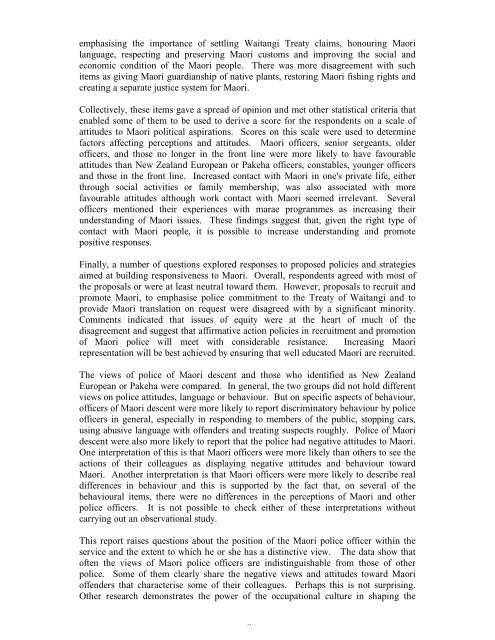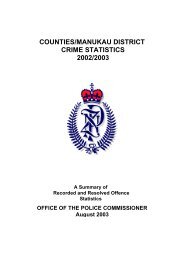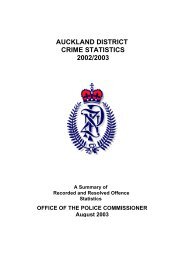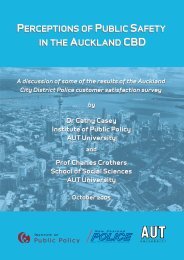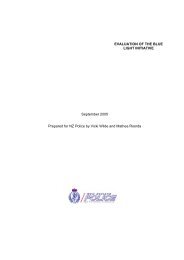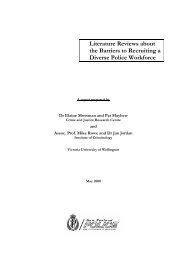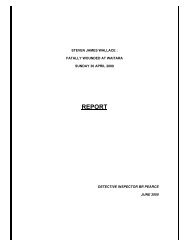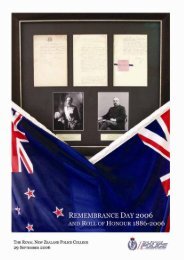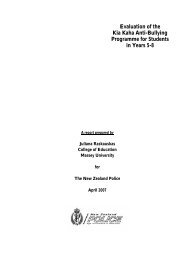Police Perceptions of Maori - Rethinking Crime and Punishment
Police Perceptions of Maori - Rethinking Crime and Punishment
Police Perceptions of Maori - Rethinking Crime and Punishment
You also want an ePaper? Increase the reach of your titles
YUMPU automatically turns print PDFs into web optimized ePapers that Google loves.
emphasising the importance <strong>of</strong> settling Waitangi Treaty claims, honouring <strong>Maori</strong><br />
language, respecting <strong>and</strong> preserving <strong>Maori</strong> customs <strong>and</strong> improving the social <strong>and</strong><br />
economic condition <strong>of</strong> the <strong>Maori</strong> people. There was more disagreement with such<br />
items as giving <strong>Maori</strong> guardianship <strong>of</strong> native plants, restoring <strong>Maori</strong> fishing rights <strong>and</strong><br />
creating a separate justice system for <strong>Maori</strong>.<br />
Collectively, these items gave a spread <strong>of</strong> opinion <strong>and</strong> met other statistical criteria that<br />
enabled some <strong>of</strong> them to be used to derive a score for the respondents on a scale <strong>of</strong><br />
attitudes to <strong>Maori</strong> political aspirations. Scores on this scale were used to determine<br />
factors affecting perceptions <strong>and</strong> attitudes. <strong>Maori</strong> <strong>of</strong>ficers, senior sergeants, older<br />
<strong>of</strong>ficers, <strong>and</strong> those no longer in the front line were more likely to have favourable<br />
attitudes than New Zeal<strong>and</strong> European or Pakeha <strong>of</strong>ficers, constables, younger <strong>of</strong>ficers<br />
<strong>and</strong> those in the front line. Increased contact with <strong>Maori</strong> in one's private life, either<br />
through social activities or family membership, was also associated with more<br />
favourable attitudes although work contact with <strong>Maori</strong> seemed irrelevant. Several<br />
<strong>of</strong>ficers mentioned their experiences with marae programmes as increasing their<br />
underst<strong>and</strong>ing <strong>of</strong> <strong>Maori</strong> issues. These findings suggest that, given the right type <strong>of</strong><br />
contact with <strong>Maori</strong> people, it is possible to increase underst<strong>and</strong>ing <strong>and</strong> promote<br />
positive responses.<br />
Finally, a number <strong>of</strong> questions explored responses to proposed policies <strong>and</strong> strategies<br />
aimed at building responsiveness to <strong>Maori</strong>. Overall, respondents agreed with most <strong>of</strong><br />
the proposals or were at least neutral toward them. However, proposals to recruit <strong>and</strong><br />
promote <strong>Maori</strong>, to emphasise police commitment to the Treaty <strong>of</strong> Waitangi <strong>and</strong> to<br />
provide <strong>Maori</strong> translation on request were disagreed with by a significant minority.<br />
Comments indicated that issues <strong>of</strong> equity were at the heart <strong>of</strong> much <strong>of</strong> the<br />
disagreement <strong>and</strong> suggest that affirmative action policies in recruitment <strong>and</strong> promotion<br />
<strong>of</strong> <strong>Maori</strong> police will meet with considerable resistance. Increasing <strong>Maori</strong><br />
representation will be best achieved by ensuring that well educated <strong>Maori</strong> are recruited.<br />
The views <strong>of</strong> police <strong>of</strong> <strong>Maori</strong> descent <strong>and</strong> those who identified as New Zeal<strong>and</strong><br />
European or Pakeha were compared. In general, the two groups did not hold different<br />
views on police attitudes, language or behaviour. But on specific aspects <strong>of</strong> behaviour,<br />
<strong>of</strong>ficers <strong>of</strong> <strong>Maori</strong> descent were more likely to report discriminatory behaviour by police<br />
<strong>of</strong>ficers in general, especially in responding to members <strong>of</strong> the public, stopping cars,<br />
using abusive language with <strong>of</strong>fenders <strong>and</strong> treating suspects roughly. <strong>Police</strong> <strong>of</strong> <strong>Maori</strong><br />
descent were also more likely to report that the police had negative attitudes to <strong>Maori</strong>.<br />
One interpretation <strong>of</strong> this is that <strong>Maori</strong> <strong>of</strong>ficers were more likely than others to see the<br />
actions <strong>of</strong> their colleagues as displaying negative attitudes <strong>and</strong> behaviour toward<br />
<strong>Maori</strong>. Another interpretation is that <strong>Maori</strong> <strong>of</strong>ficers were more likely to describe real<br />
differences in behaviour <strong>and</strong> this is supported by the fact that, on several <strong>of</strong> the<br />
behavioural items, there were no differences in the perceptions <strong>of</strong> <strong>Maori</strong> <strong>and</strong> other<br />
police <strong>of</strong>ficers. It is not possible to check either <strong>of</strong> these interpretations without<br />
carrying out an observational study.<br />
This report raises questions about the position <strong>of</strong> the <strong>Maori</strong> police <strong>of</strong>ficer within the<br />
service <strong>and</strong> the extent to which he or she has a distinctive view. The data show that<br />
<strong>of</strong>ten the views <strong>of</strong> <strong>Maori</strong> police <strong>of</strong>ficers are indistinguishable from those <strong>of</strong> other<br />
police. Some <strong>of</strong> them clearly share the negative views <strong>and</strong> attitudes toward <strong>Maori</strong><br />
<strong>of</strong>fenders that characterise some <strong>of</strong> their colleagues. Perhaps this is not surprising.<br />
Other research demonstrates the power <strong>of</strong> the occupational culture in shaping the<br />
vii


